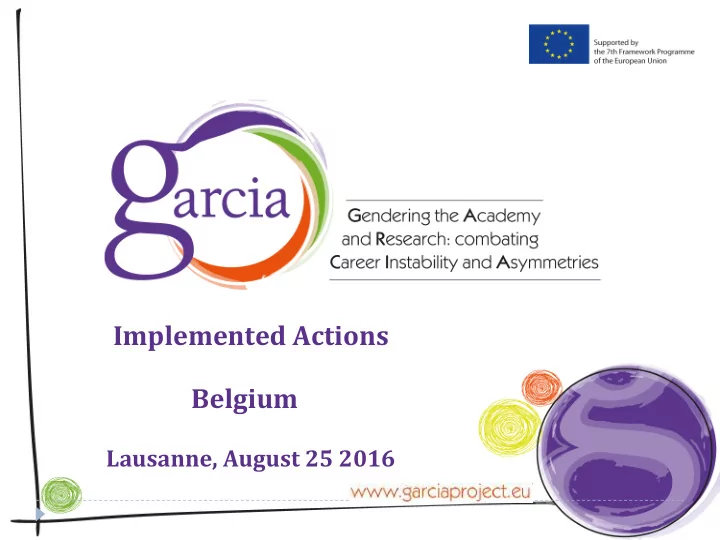

Implemented Actions Belgium Lausanne, August 25 2016
Previous focus groups and workshops : October to December 2015 } Focus Group Mothers (4 attendees : 2 ELI/2 IACCHOS + Trade Union and Senior Administrative Officer) } Focus Group Fathers (4 attendees: 3 ELI/1 IACS) } Focus Group Masculine Culture (7 attendees: 4 IACS/ 3ELI) } Workshop Gender Concept (7 « experts »)
WP4 Training courses on integrating gender perspective into research and teaching } Partnership with the Councellor of the rector for gender policy. This training session can be seen as a first attempt to communicate about gender in the UCLouvain and, to this regard, could be seen as an achievement. } We organised two training sessions (2 hours per session): one in SSH Department (IACCHOS) and one in STEM Department (ELI). } Objective: raising awareness among university members of the importance of gender equality and the gender approach in general and in research and teaching in particular. } The structure of the training composed of: 1/ a presentation of the Gender Action Plan by the rector’s counsellor, 2/ a presentation of some results of the research conducted under the Garcia project and 3/ a time for exchange. } The first training session took place in IACCHOS on May the 25 th . The second took place in ELI on June the 1 st .
} In both institutes all members where personally invited by the presidents to take part to the training (so more than 100 people in each institute). } The first training session organised in IACCHOS was not a great success as only two members of the Institute (namely its president and its former president) attended it. The second training session in ELI gathered 10 participants (the president of the institute, 1 professor, 1 post-doc researcher and 7 administrative staff members). } It was a good test for us. } Through the preparation of these two training sessions we have built a good relationship between the team involved in the Garcia project and the central administration of UClouvain responsible for the management of the Gender Action Plan. This is important for the future. } At UCLouvain the different categories of staff members are strongly encouraged to take professional training. These trainings are managed by an autonomous internal body within the university called the Louvain Learning LAB . For the future we will have to negociate with this LAB the integration of a training on gender.
WP6 Mentoring } Before to implement actions, it was fundamental for us: à To work with the central authorities à To have a state of the art (define the concepts, types of mentoring…) à To do the SWOT analysis and have interviews with presidents of Institutes à To design a program of mentoring (a transformative mentoring) } Next academic year, a self taylored mentoring program will be implemented with the support of the authorities.
WP7 Reflexive Working Group with Committee Members } Two workshops were organised with committee members. The first one with committee members from the STEM department (ELI) took place on March the 25 th 2016 (11AM to 1PM), the second with committee members from the SSH department (IACCHOS) also on the 25 th of March (2PM to 4PM). } We divided the meeting in three parts: 1/ a presentation of the gender issue and some actual facts about the “leaky pipeline” phenomenon; 2/ a discussion of our analysis of different criteria of excellence in UCL: the “competition set of criteria” (international standards) and the “nomination set of criteria” (local requests); 3/ a time for recommendations
} 22 full professors were contacted in ELI (11 replied to us) and we targeted more precisely 11professors in IACHOSS (all replied to us). } Difficulties to find a date in the both cases. } For ELI: 4 full professors (men) took part to the meeting (including a former rector) } For IACCHOS: 4 professors (3 men and 1 woman) } If participants were keen to recognise gender inequalities as a general problem for universities, they tend to minimise the prevalence of this issue in their institute. } The committee members agreed with the existence of two sets of criteria } The work/life balance issue was the most discussed, and was connected to the question of academic excellence (international mobility, publish or perish, omnipresence and total availability…)
WP7 Reflexive Working Group for prospective candidates } We organised two reflexive workshops (2 hours each), one in the STEM department (ELI - ) and one in the SSH department (IACCHOS). } These workshops gathered a small amount of participants (4 for IACCHOS, one female post-doc, 15 contacted / 3 for ELI, one female post- doc, more than 100 contacted). } We organized the discussion in three distinctive rounds. 1/we asked the participants to present themselves and to talk freely about the topic of this meeting (making an academic career). 2/ We presented four “ relationships to the scientific career ” that are four ideal-typical modalities of engaging with academic work (full engagement, optimistic engagement, ambivalent and distant). 3/ We presented the results the conception of “academic excellence” (the sets of criterias: competition and nomination). } We also organised a presentation of some results of the Garcia project at destination of all young researchers of IACCHOS that attended a training day for young researcher organised by IACCHOS (April 13 th ). This presentation reached between 30 and 40 young IACCHOS researchers.
} The main feeling of young researchers was frustration and they have a strong critic about the system of precariousness and productivity } It was difficult to give tricks and tips because Postdocs and PhD students seem very aware of the “new” academic rules of the game: maybe more than some senior professors. In Belgium, the new regulation (an accountable-productivist short term regime) has been implemented for the last 15-10 years.
Recommend
More recommend